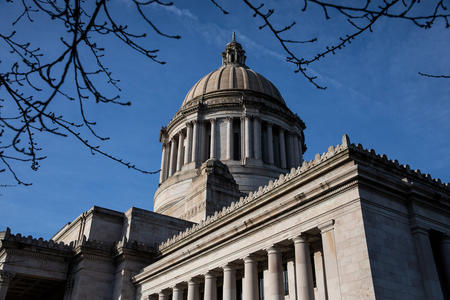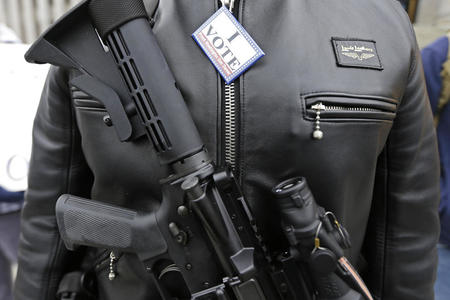The final deal on Senate Bill 5536 collapsed shortly before 8 p.m., following two years of lawmakers struggling to reach consensus after the Washington Supreme Court struck down the state’s felony drug possession statute. The court ruling invalidated decades of convictions and related orders to pay restitution.
After the ruling in 2021, legislators and Gov. Jay Inslee approved a temporary stopgap making unlawful possession of a drug a misdemeanor crime on the third occurrence, with law enforcement officers supposed to give treatment options the first two times. That temporary approach, which was broadly criticized, is set to expire in July.
Sunday’s dramatic finish capped a busy year in the Democratic-controlled Legislature. Lawmakers passed a host of progressive priorities, including a ban on assault-style rifles, and protections for reproductive healthcare and gender affirmation. Republicans, too, scored perhaps a surprising number of wins, including easing regulations to build housing and a new capital-construction budget that GOP lawmakers praised as bipartisan.
With consistent Republican pressure Republicans forced Democratic leaders to ultimately pass a law loosening some restrictions on police vehicle pursuits. A law limiting vehicle pursuits was part of a package of 2021 policing reforms passed after the deaths of George Floyd, Manuel Ellis and others in 2020.
Meanwhile, the new $69.2 billion operating budget spends some of the first dollars from Washington's 2021 carbon cap-and-invest law, passed in 2021 to address climate change.
"These are historic state investments in driving down emissions, it's the first time we've seen this level of funding to address climate change," said Clifford Traisman, state lobbyist for advocacy group Washington Conservation Action. He praised three parts in particular: the investments for better weatherization, money to clean up medium-and heavy duty trucks, and using state forests to help with carbon sequestration.
Another Sunday surprise: House Republican Minority Leader J.T. Wilcox, R-Yelm, announced he was stepping down from leadership. Wilcox, who will remain as a rank-and-file lawmaker, steered the party through turbulent years in state and national politics.
In a question-and-answer session with reporters, Wilcox said he was abiding by a pledge to step down if his party didn’t gain seats in last year’s elections.
“I believe it’s also time for generational change in our politics in a broader sense,” he said in a letter Sunday. “Experience is valuable in government, but it also has a shelf life. I hope that all across our state and country we can recognize the value of a newer generation of leaders who will have less investment in the antagonisms that have consumed the last years.”
And it wasn’t all roses for democracy in Olympia this year. The legislative session began in January with revelations that lawmakers have been quietly blacking out emails, texts, memos and other communications in violation of a 2019 Supreme Court order that those documents are disclosable as part of the 1972 voter-approved Public Records Act. Those disclosures led Democratic lawmakers to shelve a broader bill that would begin to nibble at the public’s ability to request documents. But the Legislature continued to pass other exemptions as part of a decades-long quest to increase government secrecy at the expense of the Public Records Act.
Democratic politicians and court rulings will ultimately decide how far Washington – home of one of the strongest Watergate-era transparency laws – backslides in terms of allowing the people know what their government is doing.
For more details about the work of the 2023 Legislature, visit Crosscut’s bill tracker and read the extended summary below.
Bills that passed this year:
– Interstate sale of cannabis: Senate Bill 5069 will allow Washington to enter marijuana import/export compacts with other states immediately after Congress gives the green light. Senate Bill 5069 passed the House on March 1 and the Senate on April 12, both with bipartisan support. Currently, 39 states and Washington, D.C., have legalized medical cannabis and 21 states and Washington, D.C., have legalized recreational marijuana. Several measures have been proposed in Congress to legalize it, or to remove the possession and sale of marijuana from federal laws that make it a felony.
–988 mental health crisis support: House Bill 1134 will fund mobile units and training for crisis teams as well as help increase exposure for the crisis line, which was launched in addition to the still-functional 10-digit suicide prevention hotline. The proposal also created a pathway toward better coordination between the 988 and 911 systems.The measure gained unanimous approval in both houses. A concurrence vote in the House on Senate changes was not unanimous, however. The Senate delayed implementation of some aspects of the proposal as well as a series of other changes outlined in this legislative document.
–Battery stewardship: Senate Bill 5144 simplifies battery recycling and provides more accessible permanent disposal sites where rural and urban residents can drop off batteries. The measure also requires manufacturers, and sometimes companies selling battery-containing products like remote controls, to make recycling commitments if they want to sell batteries in Washington. The bill was sent to the governor for his signature on April 19.
–Police chases: Sponsored by Sen. John Lovick, D-Mill Creek, Senate Bill 5352 eases some restrictions on law enforcement vehicle pursuits that were put in place in 2021. Those restrictions were part of a package of policing reforms approved after the deaths of people of color that year at the hands of police, including Manuel Ellis in Tacoma and George Floyd in Minneapolis. Among other things, the legislation allows an officer to pursue a person if there’s reasonable suspicion they are committing – or have committed – a violent offense. Those would include a sex offense, vehicular assault or domestic violence assault, or driving under the influence, according to a legislative analysis.
–Orca buffer zone: will require recreational boats on Puget Sound to stay farther from the area’s southern resident killer whales. Gov. Jay Inslee is expected to sign Senate Bill 5371, which would expand the buffer zone between southern resident orcas and boats from 400 to 1,000 yards. Washington’s Democrat-dominated Senate passed SB 5371 on a 29-18 party-line vote on Feb. 28, and it passed the House by a bipartisan 95-2 vote on April 11.
– Over-the-counter sexual-assault kits: House Bill 1564 would ban the sale of over-the-counter sexual-assault kits in Washington. HB 1564 was sent to the governor on April 19. It will put Washington among the first states in the country to ban the sale of a product advocates say misleads survivors of sexual assault about their options.
– Name-change privacy: Senate Bill 5028, which was signed by the governor on April 6, expands the current name-change process to allow Washingtonians to file some name change petitions in superior court to make it safer and more accessible to change one’s name. The bill was designed to protect the privacy of refugees, people who are transgender or gender-nonconforming and those escaping domestic violence.
– Abortion and reproductive health care: A Shield Law, House Bill 1469, would protect people who seek, provide, or facilitate abortion in Washington from out-of-state investigations and prosecutions, and would apply to gender-affirming care providers as well as abortion clinics. A second proposal, House Bill 1340, would prevent medical licensing boards from retaliating against clinicians for providing reproductive health services and gender-affirming care. Both bills were sent to the governor on April 19.
– Free school lunch program: A bill to expand Washington’s free lunch program, House Bill 1238, was sent to the governor on April 20. The proposal originally called for free lunch for all school children, but has ,now been scaled back to a phased expansion of the program over the next few years, so that by the 2024-25 school year, K-5 elementary schools could offer universal free breakfasts and lunches if up to 30% of students at the school qualify for free or reduced lunch.
– State dinosaur: For the fifth year in a row, Suciasaurus rex is being considered for the honor of becoming Washington’s state dinosaur, because one of its bones is the only dinosaur fragment found in Washington – so far. House Bill 1020 was delivered to the governor on April 20.
Bills that didn’t make it
– Felony charges for harassing election workers: House Bill 1241 would have made it a Class C felony to harass an election worker, and also allows those workers to register for the state’s address confidentiality program. That program is currently available for victims of sexual assault, trafficking, domestic violence or stalking. The proposal passed the House but failed in the Senate.
– Working conditions for exotic dancers: Senate Bill 5614 would have upgraded safety measures and guard against unfair terminations of dancer contracts, as well as allow liquor to be sold at strip clubs. The bill proposal would help even out the economic relationship between dancers and businesses, because if strip clubs can sell alcohol, they will be more likely to make a profit without depending on fees that dancers pay for the privilege to work there. The bill passed the Senate on March 1 but stalled in the House.
– Pink tax: Six Kirkland high school students are pushing Senate Bill 5171, a proposal to end gender-based pricing in Washington. The bill would prohibit retailers from charging different prices for two products marketed to different genders that are the same or “substantially similar.” The bill passed the Senate but not the House.
– DUI restrictions: A proposal to lower the blood alcohol content (BAC) for a DUI charge, Senate Bill 5002, from 0.08% to 0.05%, did not make it out of the Senate. Nor did another traffic safety proposal, Senate Bill 5514, which would have outlawed right turns on a red light.
– School start time: A bill to lower the compulsory school age from 8 – the age of a typical second or third grader – to 6 did not make it out of the Senate. Senate Bill 5020 would have required children as young as 6 to enroll in a public or private school or be homeschooled.
– Cap on annual rent increases: House Bill 1389, which would have capped increases in rent by a landlord in a given year, did not advance.
– Executive emergency powers reform: Republicans have wanted to limit Inslee's emergency powers after the governor imposed some of the strictest public-health measures of any state during the COVID-19 pandemic. But House Bill 1535, which would have given the Legislature more say in ending emergency proclamations, didn’t even get a committee hearing.
Get daily news in your inbox
This newsletter curates some of the most important headlines of the day from Crosscut and other news outlets.






